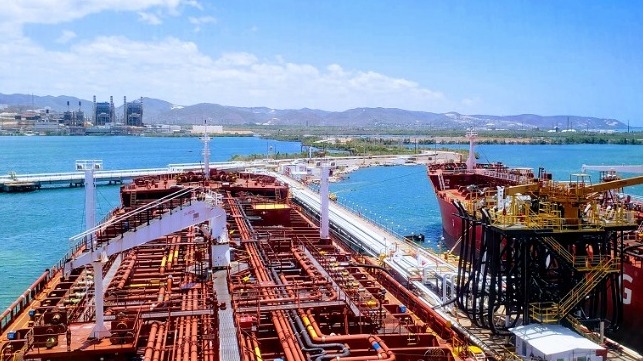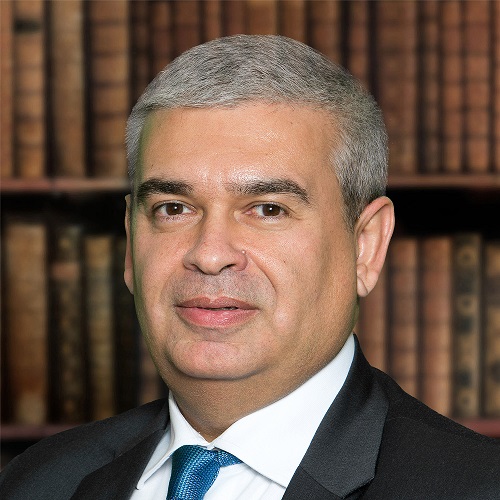Inchcape Plans Growth in America With New Corporate Structure
Inchcape Shipping Services’ VP Marine Services for the Americas, Joseph Bruno, explains how the company aims to flex its market muscle

 Joseph Bruno bubbles with enthusiasm over his new role and is itching to make the move to Inchcape Americas’ nerve center in Houston to lead a new regional management team backed by local know-how, industry-leading technology, and a new consolidated network of Regional Operating Centers (ROCs).
Joseph Bruno bubbles with enthusiasm over his new role and is itching to make the move to Inchcape Americas’ nerve center in Houston to lead a new regional management team backed by local know-how, industry-leading technology, and a new consolidated network of Regional Operating Centers (ROCs).
For the moment he is commuting between Rio and Santos in Brazil, but aims to be in the U.S. by January. “This is much more than just geography,” says Bruno. “Our goal is to be the Number One ship agent in the Americas. We want to double our volume and be recognized as the most reliable player in the market.”
He first wants to dispel any lingering notion that Inchcape is a pure tanker specialist. “They’re still our largest revenue earner globally, and in North America, but we also have loads of experience handling dry bulk ships, for example. For U.S. that’s a major growth area alongside project cargo, breakbulk, navy, and cruise,” he says.
“It’s taken time to assemble a strong team, as well as a lot of market intel. But now we’re there – with 300 staff at 195 ports backed by great IT infrastructure and a brand-new structure to support business development. Now our focus is firmly on how we can improve customers’ business – in all sectors – for the best price.”
It’s all about trust
Ship agency globally is fragmented – small local agents account for 80 percent of port calls. Although the North America market is dominated by a handful of bigger players, there are still around 300 agents in the U.S. alone, from one-man bands upwards. “We believe lack of trust is at the core of this fragmentation,” says Bruno. “Trust is crucial for agents and operators to cooperate successfully, and central to everything we do. We aim to drive operational transparency through technology, standardized levels of service, and integrated global compliance. That kind of value is hard to beat.”
Bruno is confident Inchcape can grow its market share as, arguably, the only pure-play global ship agency (although it also offers full cargo agency, dry-docking, survey and inspection, crew logistics, financial management and bunker calls). “Globally we have just under 3,000 employees and handled 65,000 port calls in 2019, as well as thousands of crew changes,” he says. “That’s a great springboard for growth.”
Inchcape saw the best way to streamline service delivery was to unify the Americas into a single region, with ROCs ensuring quality based on best practice. “With the ROCs we can consolidate responses as well as increase response times. We can look at the whole voyage from a meta-level and provide tailored information on the best service options while minimizing downtime and delays,” says Bruno.
Communication is everything
“Shipping isn’t 9 to 4. You’ve got to be ready for anything, and the ROCs provide much better coverage for all vessel stakeholders. They ensure 24/7 information flow across the region from Monday to Monday. Time is money and our goal is one-stop communication,” he says.
The ROCs are also key to optimizing in-house dialogue. “Having dispersed people working in synergy makes solving and anticipating problems much easier. Pooling peer experience really pulls it together,” Bruno says.
Inchcape Americas’ four ROCs in North America comprise New York covering the east coast down to the Everglades; San Francisco covering the west up to Vancouver; Houston covering the entire U.S. Gulf except New Orleans; and New Orleans covering the many terminals on the Mississippi. Panama covers the Caribbean, Central America, and Mexico. Valparaiso takes in Chile, Ecuador, and Peru, with Rio handling east coast South America except for Uruguay, where Inchcape works with a business partner.
Digital tools
“Technology is critical to our brand differentiation and optimal operational performance,” says Bruno. “Our two digital pillars are our World of Ports [WoP] application, for which we launched the latest iteration in June, and our Optic operating system that we’re in the process of rolling out right now.”
WoP is a constantly updated, single-source digital service built on data from Inchcape Shipping Services’ global network of 4,600 ports, 15,000 terminals, and 36,000 individual berths. Using a Google Maps interface users can get accurate details on port parameters and restrictions, while integrated AIS feeds track vessel movements for optimal arrival and departure. It also includes enriched port data – including environmental information, facilities details and operational notes – with a customizable client dashboard and vessel alerts. “There’s nothing out there quite like it,” says Bruno. “By the end of 2020 we will have 100 percent coverage, with our local service teams acting like our customers’ eyes and ears on the ground to ensure maximum business efficiency.”
Meanwhile, Optic captures all operational, financial, time, and events data from each port. “You can see what your assets are doing in as much detail as you want, when you want, and how you want,” says Bruno.
Covid impact
As well as speeding up digitalization, Bruno says the pandemic necessitated new working routines on the fly. “Our people and IT infrastructure proved their worth, and we’re very satisfied,” he says. “Being quick to adapt highlights our strength as a global player and shows we’re more important than ever in a crisis.”
“We’ve been around a long time, and it’s going to stay that way. We’ve been through two world wars, the Spanish flu and recessions,” says Bruno. “Our size and financial strength are a comfort factor, especially for shipping companies struggling economically. Can you be sure your money is safe if you’re asked to prefund an agent with 80 percent to 100 percent of upcoming port calls? Will they still be in business when your ship turns up? With Inchcape there’s no risk,” Bruno says.
Inchcape estimates a 5 percent to 7 percent decline in seaborne trade as the world readjusts. Some sectors like cruise have seized up, but others are still on track. “From a 20 percent reduction in activity in April/May things are starting to bounce back, notably crew changes. That in itself generated masses of work for our service teams, what with arranging Covid tests, social distancing, and cancelled flights. They’re on the frontline finding solutions, visiting vessels, and working remotely,” says Bruno.
He highlights the 93 percent acceptance rate and 80 percent response rate in Inchcape’s quality surveys since Covid hit. “Every vessel gets that automated form. Feedback covers not only the port call but all husbandry services. Over 90 percent of customers say they are satisfied,” he says. “For U.S. that’s pretty special sauce as we grow our Americas pie.”
Bruno the bloke
From his accent you might take Bruno for a Brit. He was raised in Jersey in the Channel Islands. “My folks are Portuguese, but we only moved to Brazil when I was 15. I hardly spoke the language, but you just have to get on with it,” he says.
As a youngster he set heart on aviation, but it was his English that landed him his first job at a Greek ship-chandlery in his home town of Santos. “I was 17. That was 34 years ago and it’s been shipping ever since,” he says.
As well as ship agency and stevedoring, Bruno also spent two years working for a global container line in Venezuela and three years in Recife opening a new terminal for a multinational. “I’ve been fortunate to get a good understanding of the business from many angles – as customer, service provider, and agent,” he says.
Bruno is back to his roots at Inchcape. “Agency is like a black hole. It keeps sucking you back in,” he jokes. “But I love it because it’s so dynamic. You never stop learning. Always new challenges. Many different cultures. Most importantly, 80 percent of our service relies on interaction. I really enjoy developing people and seeing them succeed.”
Bruno is married with a grown-up daughter from his first marriage and a 20-year-old daughter from his present marriage. Out of the office his interests include sports, soccer specifically, as well as TV shows on history and flying. He’ll be at home in Houston.
This article is sponsored by Inchcape Shipping Services.
The opinions expressed herein are the author's and not necessarily those of The Maritime Executive.

